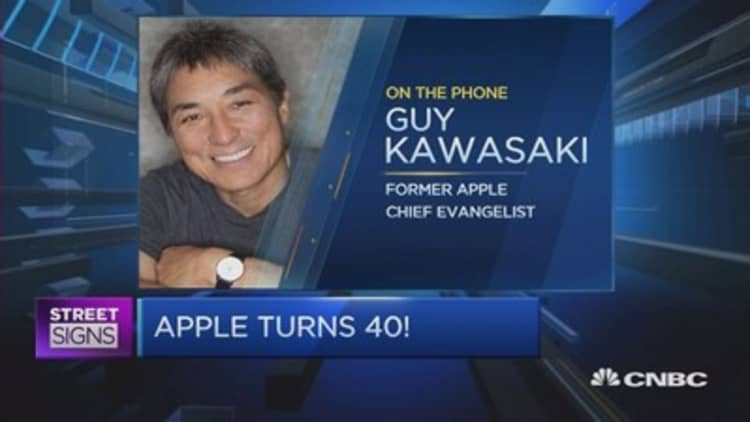
As one of the world's most successful brands celebrates its 40th birthday on Friday, its former chief evangelist told CNBC the company was facing an innovation test.
Guy Kawasaki, responsible for helping build a critical mass of support for Apple's Macintosh line during the 1980s and 1990s, praised the company's transition from garage start-up to tech behemoth, but highlighted the importance of product innovation.
"What's going to make us want to abandon what's already there and go to the next curve? That's the big test for Apple," he said.
"Theoretically, they should be creating a computer that makes everyone want to throw away their Macintosh, just like Macintosh made people want to leave the Apple II," he continued, referring to the company's old series of desktop computers.
Innovation isn't a matter of upgrading the operating software or making devices smaller and flatter, he noted.
"They should be milking their cash cows to get new calves. But that takes enormous courage and vision."
Apple has a long history of bringing innovative ideas to the market. Even its innovation failures have had an interesting track record.
In his last column for the Wall Street Journal in 2013, storied technology columnist Walt Mossberg wrote that the Newton Message Pad, introduced in 1993, was one of the twelve most influential tech products over the past two decades. The Newton promised to recognize handwriting, which it failed to do, but it was a forerunner of other technology, including artificial intelligence, Mossberg said.
Other Apple products that made Mossberg's list were the iPod digital media player, released in 2011, the iPhone, first released in 2007, the MacBook Air, released in 2008, and the iPad, released in 2010.
When asked about the company's latest iPhone SE, Kawasaki called it a "back to the future" moment, referring to the device's smaller size.
"In fact, I ordered an SE this afternoon; I'm still drinking the Kool-Aid, I guess," he chuckled.
Critics often say CEO Tim Cook lacks the vision and drive of his predecessor Steve Jobs, but in the long run, Kawasaki believes Apple's powerful brand image has remained intact.
"With companies this large, you can always pick apart little things. For example, their most recent iPhone still doesn't have wireless charging. Samsung has that. So you have to ask those questions, but the big picture is that from a branding and marketing perspective, people lust after this stuff."
Kawasaki believes the Cupertino-based giant was right to support privacy rights in its recent battle against the U.S. Department of Justice regarding a terrorist's locked iPhone.
"If they had created a backdoor just for the good guys, roughly a day later, the bad guys would have it," he said.


